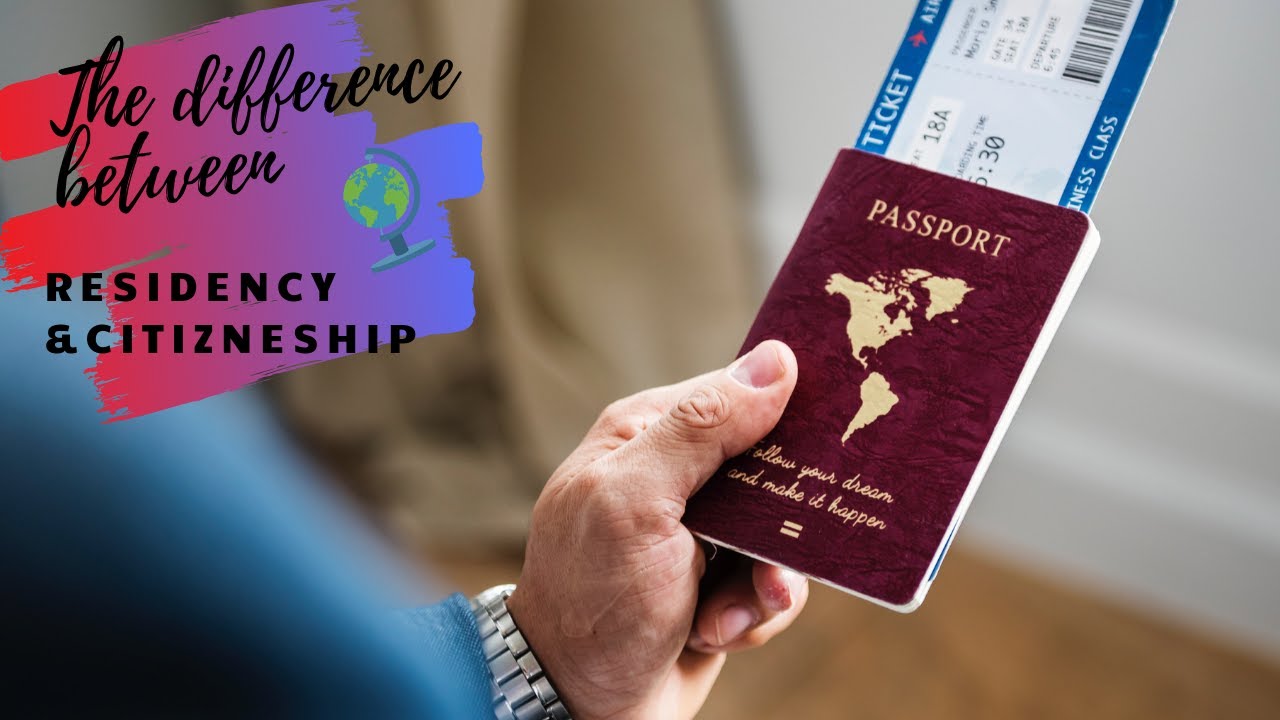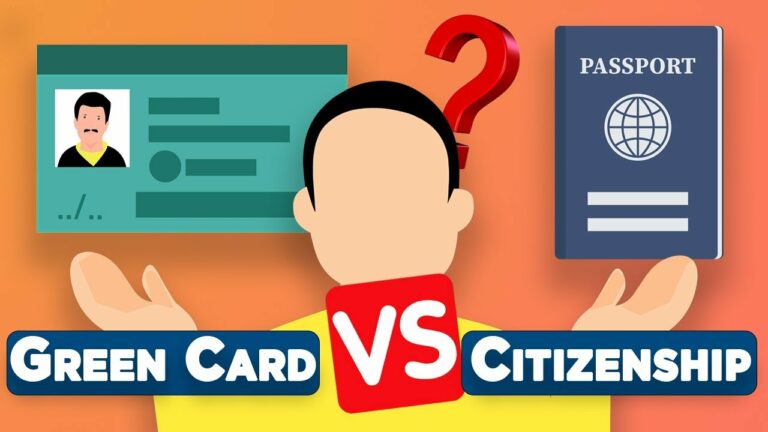Citizenship vs Residency: A Golden Visa Comparison | goldenvisareviews.com
I have had my fair share of experiences in navigating the complex world of citizenship and residency. It’s a topic that can be confusing for many, but it’s one that is essential to understand for anyone considering a move abroad. The question of whether to pursue citizenship or residency can have a significant impact on your life as an expat. In this article, I will delve into the differences between citizenship and residency, using real-life examples from my own experiences and providing practical tips to help you make an informed decision. So whether you’re considering a move abroad for work, retirement, or adventure, read on to discover the pros and cons of citizenship vs residency.
Is resident the same as citizenship?
One of the most common questions for those planning to move or live abroad is the difference between residency and citizenship. While the two terms are often used interchangeably, they are not the same thing. Understanding the difference between residency and citizenship is crucial for anyone planning to move abroad or is already living as an expat.
Residency
Residency refers to the legal status of an individual who is living in a foreign country on a temporary or permanent basis. This status is often granted by the government of the host country and allows the individual to live and work in the country for a specified period. Residency can be obtained through various means, including work visas, student visas, retirement visas, and investment visas.
As a resident of a foreign country, you are entitled to certain benefits such as legal protection, access to healthcare, and other public services. However, residency does not grant you the right to participate in political activities such as voting, run for office, or obtain a passport of the host country.
Citizenship
Citizenship, on the other hand, refers to the legal status of an individual who is recognized as a member of a particular country. Citizenship is often acquired by birth, marriage, or naturalization. As a citizen, you have the right to participate in political activities, vote, run for office, and obtain a passport of the country.
Obtaining citizenship can be a lengthy process that often involves meeting specific criteria, such as residency requirements, language proficiency, and passing a citizenship test. Once you become a citizen, you are entitled to all the privileges and obligations of being a citizen, including the right to live and work in the country without restriction.
What’s better citizenship or residency?
When it comes to moving abroad, one of the biggest decisions you’ll face is whether to pursue citizenship or residency in your new country. Both options come with their own benefits and drawbacks, and the choice will ultimately depend on your personal circumstances and goals. In this article, we’ll explore the differences between citizenship and residency and help you make an informed decision.
Citizenship
Obtaining citizenship in a foreign country means that you become a legal member of that country’s society. You gain the right to vote, work and live permanently in that country, and access to certain benefits and services. Citizenship can also provide a sense of security and belonging, as well as the ability to travel more freely to other countries with the added protection of your new country’s passport.
However, obtaining citizenship can be a lengthy and expensive process, requiring you to meet certain eligibility criteria, such as residency requirements, language proficiency, and passing a citizenship test. Additionally, some countries may require you to renounce your current citizenship, which can be a difficult decision for many expats.
Residency
On the other hand, obtaining residency in a foreign country means that you are legally allowed to live and work in that country for a specified period of time, without becoming a citizen. Residency can be obtained through various means, such as investment, employment, or family sponsorship. Residency can offer many of the same benefits as citizenship, such as access to healthcare and education, without some of the drawbacks.
Residency can also be a stepping stone towards citizenship, as many countries offer a path to citizenship for long-term residents. However, residency may come with certain restrictions, such as not being able to vote or access certain benefits, and you may be required to renew your residency status periodically.
Which is better?
Ultimately, the decision between citizenship and residency will depend on your individual circumstances and goals. If you plan on living in a country permanently and want to fully integrate into the local society, citizenship may be the better option. However, if you’re not sure about your long-term plans and want to maintain ties to your home country, residency may be the better choice.
It’s also important to consider the legal requirements, financial costs, and cultural adaptation that come with both options. Research the visa and citizenship programs available in your chosen country, and consult with legal and financial professionals to determine the best course of action for you.
In conclusion
Moving abroad is a life-changing decision, and choosing between citizenship and residency is just one of the many important choices you’ll make. Both options come with their own benefits and drawbacks, and the decision will ultimately depend on your personal circumstances and goals. Whatever you choose, make sure to do your research, seek professional advice, and embrace the challenges and excitement that come with living as an expat.
Is green card citizenship or residency?
As an expat or someone planning to move abroad, it’s important to understand the difference between citizenship and residency. While both terms refer to legal status in a foreign country, they have distinct meanings and implications.
A green card, also known as a Permanent Resident Card, is a document that grants an individual the legal right to live and work in the United States. It is a form of residency, not citizenship.
Residency refers to an individual’s legal status in a foreign country, allowing them to live and work there for a specified period of time. A green card holder is considered a permanent resident of the United States, but they are not a citizen.
Citizenship, on the other hand, refers to an individual’s legal status as a member of a particular country. Citizenship grants an individual rights and privileges such as the ability to vote, hold public office, and obtain a passport. It also comes with responsibilities such as paying taxes and abiding by the laws of the country.
Green card holders are not considered citizens of the United States, but they may be eligible to apply for citizenship after meeting certain requirements. These requirements include living in the United States for a certain period of time, passing a citizenship test, and demonstrating proficiency in English.
It’s important to note that citizenship and residency have different implications when it comes to taxes, voting, and other legal matters. As a green card holder, you are required to pay taxes in the United States on your worldwide income. However, you may not be able to vote in federal elections or hold certain public offices. As a citizen, you have full rights and responsibilities under the law.
If you are considering moving abroad or have recently moved, it’s important to understand the difference between citizenship and residency. While a green card grants you the right to live and work in the United States, it does not make you a citizen. If you are interested in obtaining citizenship, be sure to research the requirements and process carefully.
Living abroad can be an exciting and rewarding experience, but it also comes with its own set of challenges. From finding a place to live to navigating cultural differences, there are many practical considerations to keep in mind. Be sure to do your research and seek out resources and support to help make your transition as smooth as possible.
Do you become a resident or citizen first?
When planning to move abroad, one of the biggest decisions to make is whether to become a resident or citizen of your new country. Both options have their advantages and disadvantages, and it’s essential to consider your long-term goals and priorities before making a decision.
Residency
Residency refers to living in a country on a long-term basis, typically for at least six months out of the year. Many countries offer various residency programs that provide individuals and families with the legal right to live and work in the country. In most cases, residency is a prerequisite for citizenship.
One of the benefits of residency is that it allows you to test the waters and get a feel for your new country before committing to citizenship. Residency can also be a quicker and easier process to obtain than citizenship, as it often requires fewer requirements and paperwork. Additionally, residency may offer certain benefits, such as access to healthcare, education, and social services.
Citizenship
Citizenship, on the other hand, refers to being a legal member of a country with all the rights and responsibilities that come with it. Citizenship typically requires a more extended process than residency and often involves passing language and cultural exams and meeting specific residency requirements.
The benefits of citizenship include the right to vote, access to certain jobs and government benefits, and the ability to travel with a passport from your new country. Citizenship also provides a sense of belonging and identity to your new country, which can be valuable for some individuals.
Which one should you choose?
The decision to become a resident or citizen ultimately depends on your long-term goals and priorities. If you’re not quite sure about your new country and want to test the waters, residency may be the best option for you. If you’re committed to living in your new country long-term and want to fully integrate into the culture, citizenship may be the better choice.
It’s also essential to consider the practicalities of obtaining residency or citizenship, such as the cost, time, and paperwork involved. Working with an experienced immigration lawyer or consultant can help you navigate the process and make an informed decision.
It’s essential to do your research, plan carefully, and embrace the adventure with an open mind and a willingness to learn and adapt to your new culture.
the decision between citizenship and residency is a complex one that requires careful consideration of a variety of factors. While citizenship may offer greater benefits and security, residency provides a more flexible and accessible alternative for those looking to live abroad without committing to a long-term investment. Ultimately, the choice between citizenship and residency will depend on your personal goals, financial situation, and willingness to navigate local customs and bureaucracy.
As an expat who has navigated the challenges of living abroad in multiple destinations, I can attest to the incredible rewards and opportunities that come with choosing an international lifestyle. Whether you decide to pursue citizenship or residency, it’s important to approach the process with an open mind, a willingness to learn, and a deep respect for the local customs and culture. By taking the time to research your options, consult with professionals, and build a strong support network, you can create a fulfilling and rewarding life as an expat in a foreign country.




